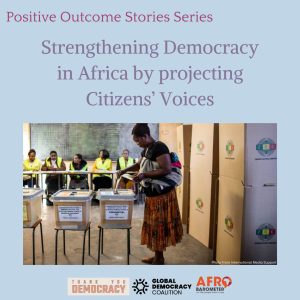Afrobarometer: Strengthening Democracy in Africa by Projecting Citizens’ Voices

Upholding democracy and its core principles throughout Africa is challenging, to say the least. Afrobarometer has been supporting that objective by gathering, analyzing, and showcasing survey data on the views and experiences of ordinary Africans for the past 25 years.
In January 2024, Afrobarometer began its 10th round of surveys, which are expected to be conducted in about 42 African countries. Its quarter-century’s worth of data on citizens’ expectations in areas such as democratic governance, transparency, and accountability serves as a key resource for policy makers, activists, development partners, journalists, and researchers across the continent.
The findings highlight governmental progress but also gaps in democratic governance, political rights, and citizen participation. With its work, Afrobarometer also contributes to ensuring free and transparent election processes throughout the continent. For instance, pre-election surveys conducted in Zimbabwe and South Africa provided insights into political trends, public perceptions of government institutions, and likely electoral outcomes. These surveys helped to spotlight the expectations of citizens, the performance of the ruling parties, and the political environment, contributing to more informed electoral monitoring and planning.
Beyond data collection, analysis, and dissemination, Afrobarometer is dedicated to building capacity for data analysis on the continent. Through workshops and training sessions, it equips policy makers, government representatives, political parties, civil society groups, journalists, youth, and women with the skills to access and interpret public attitude data using its online data analysis tool.
Through its analyses, freely available data sets, training, and online data tools, Afrobarometer supports key democracy actors, enabling them to implement well-informed policies and enhance their advocacy activities and reach. Its strategic partnerships strengthen democracy at the local, national, and continental levels; a good example is its active engagement with the African Union through the Data for Governance Alliance, which fosters data-driven advocacy among African civil society organizations and enhances democratic resilience across Africa.
